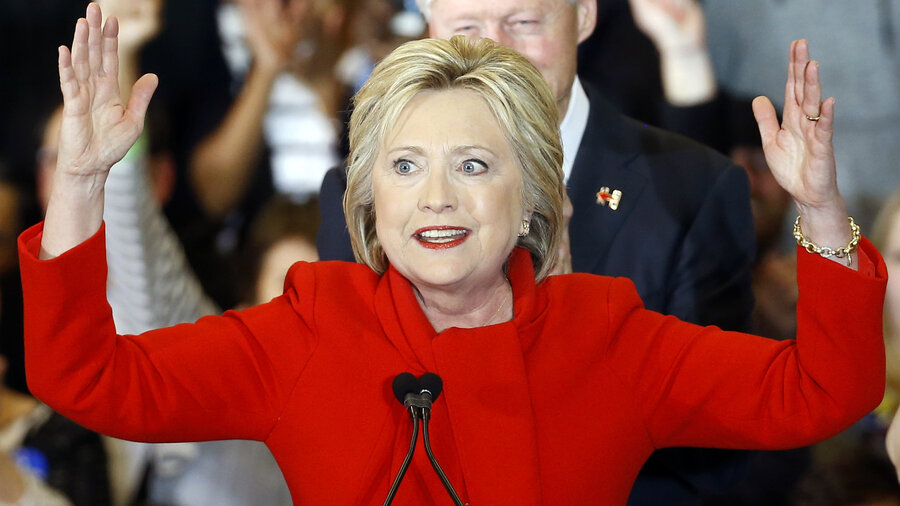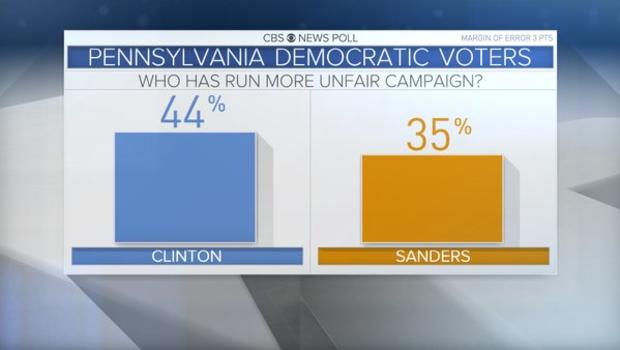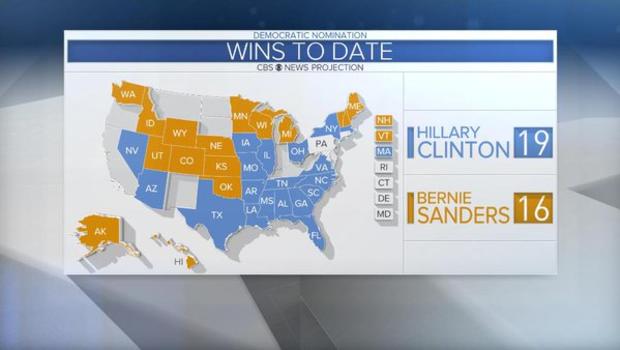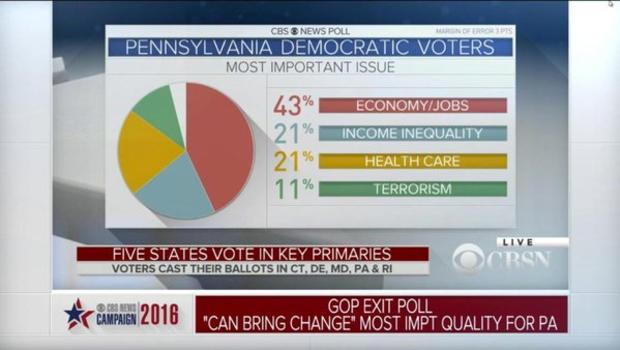Last Updated Apr 26, 2016 10:35 PM EDT

10:35 p.m.CBS News projects Clinton wins Connecticut.
9:38 p.m.In a speech clearly focused on the general election, Clinton blasted Republicans as the party of the "past" and looked past Sanders to proclaim that "love trumps hate."
"Let's win the nomination, and in July let's return [to Philadelphia] as a unified party," she told supporters at an election night event in Philadelphia.
Clinton praised Sanders and his supporters for "challenging us to get unaccountable money out of our politics and giving greater emphasis to closing the gap of inequality." "And I know together we will get that done," she added.
But she focused her attention on Republicans, specifically mentioning Donald Trump's recent comments about her playing the "woman card." "The other day, Mr. Trump accused me of playing the 'woman card,'" she said. "Well, if fighting for equal pay ... is playing the woman card, then deal me in."
Sanders, who appeared at a campaign event in West Virginia earlier Tuesday night, made no mention of the primary results.
9:17 p.m. CBS News projects Sanders wins Rhode Island.
9:03 p.m. CBS News projects Clinton wins in Pennsylvania.
8:57 p.m. As the votes are being counted in Pennsylvania, here's more from the exit poll:
 http://cbsnews1.cbsistatic.com/hub/i/r/2016/04/27/48639605-d561-4557-8bf9-b06b7a903ab9/thumbnail/1240x700/d175c9875388f5c7c31b9dc7d45503ae/426unfaircampaigndems.jpg 2x" />
http://cbsnews1.cbsistatic.com/hub/i/r/2016/04/27/48639605-d561-4557-8bf9-b06b7a903ab9/thumbnail/1240x700/d175c9875388f5c7c31b9dc7d45503ae/426unfaircampaigndems.jpg 2x" />8:49 p.m. According to CBS News exit polling, Clinton won the Maryland primary by running strong with many demographic groups--and outperforming among those with whom Sanders usually does best, like younger voters and men.
There is a gender gap among Democratic primary voters, but Clinton ran well ahead of Sanders among both women (67 percent) and men (54 percent). Sanders did well among those under 30 in Maryland, but his margin among those under 45 is one of the smallest in this primary season (54 percent for Sanders to 44 percent for Clinton). Clinton won by more than three to one among those over 45.
African Americans made up 46 percent of the Democratic primary primary electorate, and 73 percent supported Clinton. Clinton also has a comfortable lead among white voters (54 percent to 42 percent for Sanders).
Clinton won 6 in 10 votes among those with and without a college degree. Sanders won 54 percent of the votes of self-described independents, but they were only 16 percent of the primary electorate. Clinton got two-thirds of the votes of those who identify as Democrats.
Clinton even topped Sanders among Democrats who consider themselves very liberal, 58 percent to 42 percent. This is a group of voters than have generally been strong Sanders supporters. Clinton won a majority (55 percent) of votes of those who said that Wall Street mostly hurts the U.S. economy. Seventy-two percent of Democratic primary voters in Maryland believe that Clinton has the best chance of beating Trump in November; only 25 percent think Sanders has a better chance.
8:44 p.m. CBS News reports that Connecticut is now a toss-up between Clinton and Sanders.
8:33 p.m. CBS News projects that Clinton wins in Delaware.
8:31 p.m. According to the CBS News Pennsylvania exit poll, Clinton is getting strong support in Pennsylvania among women, those over 45, and non-whites.
Clinton ran about even with Sanders among men and won about 6 in 10 women's votes. Sanders won among those under 45 by a 64-to-36 percent margin; Clinton won those over 45 by almost exactly the same margin. However, 65 percent of Democratic primary voters were over 45.
Non-whites were about 30 percent of the Democratic electorate, and Clinton won them by a 64-to-36 percent margin. She and Sanders ran about even among white voters.
Sanders won about 7 in 10 votes of independents, but because of Pennsylvania's closed primary system they made up only about 16 percent of the primary electorate. Clinton won over 60 percent of the votes of those who consider themselves Democrats.
Over 60 percent of voters said that Wall Street does more to hurt the U.S. economy than help it. Sanders beat Clinton among those voters, but only by a 55-to-45 margin on an issue he has made central to his campaign. About equal numbers of voters said that foreign trade takes away jobs and creates jobs. Clinton and Sanders ran about even among those who said trade takes away jobs, while Clinton beat Sanders by 20 points among those who said trade creates more jobs.
There was strong opposition to fracking among Pennsylvania Democratic primary voters (64 percent opposed to it), but it did not appear to have much of an effect on the election outcome. Clinton and Sanders ran even among those voters opposed to fracking, and Clinton had somewhat larger lead among supporters of fracking.
Just half of Democratic primary voters said that Sanders' policies are realistic, while almost three in four said that Clinton's policies were realistic. Sixty-four percent of voters said that Clinton has the better chance of beating Trump in November, while only 32 percent said Sanders had a better chance. Three-quarters of Democratic voters think that Clinton will end up being the nominee, including almost half of Sanders voters.
8:24 p.m. CBS News reports that Sanders is leading Clinton in Rhode Island.
8:12 p.m. Here are some exit poll results from Connecticut, where Clinton is currently leading:
The demographics look among Democratic primary voters in Connecticut look a lot like they have in past contests: Clinton is winning women's votes (56 percent to 42 percent for Sanders), but is losing among men by a margin of 55 percent to 42 percent.
Sanders is running way ahead among younger voters, with a 68-32 lead among those under 45; Clinton, meanwhile, has a big lead among older voters (61 percent to 36 percent for Sanders). Almost two-thirds of Democratic primary voters are over 45.
African American voters only make up 15 percent of Democratic primary voters, and Clinton is winning about 70 percent of them. Sanders is slightly ahead among white voters (51 to 47 percent). Sanders is doing well among less affluent and middle income voters, or those with incomes under $100,000. Clinton does better among more affluent voters, or those with incomes over $100,000.
As he has done previously, Sanders is running well ahead among self-described independents, getting three-quarters of their votes. But Democratic identifiers are almost 80 percent of the primary electorate here and Clinton is winning them by a 59-40 margin.
In the state that witnessed the Newtown school shooting back in 2012, almost 6 in 10 Democratic primary voters think Clinton would do a better job of handling gun policy. Sixty-four percent of Democratic voters say Wall Street does more to hurt the economy than to help it. Those who say that it hurts the economy support Sanders over Clinton by 60 to 37 percent margin. Sixty-three percent of Democratic primary voters say Clinton has the better chance of beating Trump in November; 33 percent say that Sanders does. Two-thirds of Democratic primary voters say the campaign has mostly energized the Democratic Party, while only 30 percent say that it has divided the party.
8:00 p.m. The polls are now closed in all five states voting today. CBS News projects that Hillary Clinton wins Maryland and is also leading Bernie Sanders inPennsylvania and Connecticut.
7:33 p.m. With less than half an hour until poll close across today's five primary states, here's a look at where things stand between Clinton and Sanders:
 http://cbsnews1.cbsistatic.com/hub/i/r/2016/04/26/44c6b895-fc41-44bf-b210-222941885044/thumbnail/1240x700/e346b2cd4af12b10f49aedf219f49b13/426winssofardems.jpg 2x" />
http://cbsnews1.cbsistatic.com/hub/i/r/2016/04/26/44c6b895-fc41-44bf-b210-222941885044/thumbnail/1240x700/e346b2cd4af12b10f49aedf219f49b13/426winssofardems.jpg 2x" />6:07 p.m. Here's a look at the most important issues to Democratic voters in Pennsylvania, per the early exits:
 http://cbsnews2.cbsistatic.com/hub/i/r/2016/04/26/54c38550-1c70-4f52-af5a-636062fa39d1/thumbnail/1240x700/95731585689e4dc72e4bbd083648c17c/pademqualities.jpg 2x" />
http://cbsnews2.cbsistatic.com/hub/i/r/2016/04/26/54c38550-1c70-4f52-af5a-636062fa39d1/thumbnail/1240x700/95731585689e4dc72e4bbd083648c17c/pademqualities.jpg 2x" />5:25 p.m. While full exit polling data won't be available until closer to poll closing time at 8 p.m. tonight, early results show that the economy is still the top concern for voters. In Pennsylvania, 43 percent named it as the top issue, compared with 48 percent in Maryland and 42 percent in Connecticut. Income inequality was the second most-named issue in each state.
Asked who they believe will win the Democratic nomination, three-quarters of Democratic voters (74 percent) said they believe Clinton will win; just 23 percent said Sanders will win.
5:15 p.m. Democratic voters in five states -- Connecticut, Delaware, Maryland, Pennsylvania, Rhode Island -- will show up to polling sites Tuesday to cast votes for Hillary Clinton or Bernie Sanders on the final primary day of April.
Coming off her 16-point victory in New York last Tuesday, Clinton will be looking to increase her delegate lead in this week's Northeastern states, further narrowing Sanders' path to the nomination.
Polls in all five states close at 8 p.m. ET.
All of the states except Rhode Island operate under a closed primary system in which only registered Democrats and Republicans can cast ballots in their respective party's primary, which is likely to hurt Sanders: he has done best in states with open primaries, where independents can also vote in a party primary of their choosing.
Rhode Island has a semi-closed primary in which the closed primary rule applies but if voters are registered as "unaffiliated," they can vote in the primary of any party they choose. If that happens, that automatically enrolls them in that particular political party.
Stony Brook University political science professor Stanley Feldman contributed to this story.
You need to be a member of NASTYMIXX to add comments!
Join NASTYMIXX